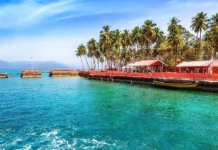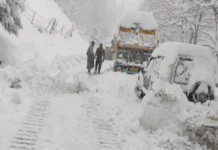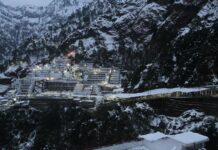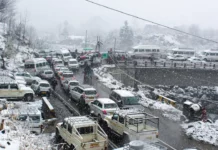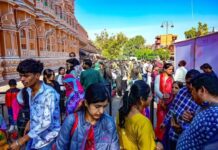 Kochi (colonial name Cochin) is a vibrant city situated on the south-west coast of the Indian peninsula in the breathtakingly scenic and prosperous state of Kerala, hailed as ‘God’s Own Country’. Its strategic importance over the centuries is underlined by the sobriquet Queen of the Arabian Sea. Informally, Cochin is also referred to as the Gateway to Kerala.
Kochi (colonial name Cochin) is a vibrant city situated on the south-west coast of the Indian peninsula in the breathtakingly scenic and prosperous state of Kerala, hailed as ‘God’s Own Country’. Its strategic importance over the centuries is underlined by the sobriquet Queen of the Arabian Sea. Informally, Cochin is also referred to as the Gateway to Kerala.
From time immemorial, the Arabs, British, Chinese, Dutch, and Portuguese have left indelible marks on the history and development of Cochin. Over the years, Cochin has emerged as the commercial and industrial capital of Kerala and is perhaps the second most important city on the west coast of India (after Mumbai/Bombay). Cochin is proud of its world class port and international airport that link it to many major cities worldwide.
This lovely seaside city is flanked by the Western Ghats on the east and the Arabian Sea on the west. Its proximity to the equator, the sea and the mountains provide a rich experience of a moderate equatorial climate.
Strictly speaking, Cochin is a small town. But, Cochin has outgrown its original bounds and is now the general name given to much of the region adjoining the original town, which now includes Cochin, Fort Kochi, Mattanchery, Ernakulam and many other nearby towns and villages. Cochin is situated in Ernakulam district in the state of Kerala. Ernakulam is also the name of a town – the administrative capital of Ernakulam district – but, for all practical purposes Ernakulam and Cochin, generally, refer to the same place.
Kochi is the arguably the ideal starting point for exploring the unfathomable diversity and beauty of Kerala, rated in the top three tourist destinations by the World Travel & Tourism Council and featured in National Geographic Traveler’s ’50 greatest places of a lifetime’.
: Like most cities in India, Kochi has a very long and illustrious history. But, the origin of the name is still shrouded in mystery. Many theories exist, but none are strong enough to be conclusive. Some historians believe that Kochi is a modified form of the word ‘Cochazhi’ which in Malayalam means ‘small sea’. Others are of the opinion that ‘Kochi’ was named so by the Chinese. According to them, traders from the court of the Chinese ruler Kublai Khan, gave Kochi the name of their homeland. The peculiar Chinese fishing nets found here, the only place outside China where they have been spotted, can possibly be attributed to the heavy Chinese influence the city has had in the past. Still another theory is that Kochi is derived from the word ‘Kaci’ meaning ‘harbor’.
Cochin harbor: Kochi earned a significant position on the world trading routes after the world famous port at Kodugallur (Cranganore) was destroyed by massive flooding of the river Periyar in 1340 AD. Records show that Kodugallur (Cranganore) was known to the Arabs and Chinese traders for centuries. After the Kodugallur port was destroyed, the forces of nature created a natural harbor at the nearby city – Kochi. Kochi started to grow and soon developed into a major trading point dealing in pepper, cardamom, cinnamon, cloves, etc., which were and still are famous for their quality.
The Arabs, British, Chinese, Dutch, Italians and Portuguese helped Kochi emerge as a bustling centre of commercial activity, connecting the mainland to the rest of the world. Kochi owes a lot to great travelers, scholars and traders like Fa Hien, Vasco da Gama, Sir Robert Bristow, etc. to her growth and prosperity. The English called Kochi ‘Mini England’, the Dutch called it ‘Homely Holland’ and the Portuguese called it ‘Little Lisbon’ highlighting Kochi’s prominence. Italian traveler Nicolas Conti wrote in his travelogue: “China is where you make your money, then Cochin is surely the place to spend it.”
Local and foreign rulers
Over the centuries, the princely state of Kochi came under numerous empires. Over time, the original local rulers were controlled by the Portuguese, Dutch, British and even the Zamorin of Kozhikode (Calicut). Around 1530 AD, under the Portuguese, Kochi grew into a prosperous town. The ruler of Kochi gave the Portuguese permission to build a fort at Kochi called ‘Manuel Kotta’ (Fort Emmanuel) – which is the first European fort in Kochi.
The Dutch invasion began around 1653 and by 1663 they emerged victorious over the Portuguese. The Dutch then built Fort Williams here. The Dutch were defeated by the great rulers of Mysore – Hyder Ali and Tipu Sultan. Finally, when the whole nation lost to the British, Kochi too became a part of the British Empire in 1814. The magnificent forts built here were destroyed by the British.
Under the supervision of Sir Robert Bristow, Kochi was developed into a major harbor and Willingdon Island was created. Willingdon Island now accommodates the Cochin Port, Naval Airport and the headquarters of the Southern Naval Command apart from a host of other trading and commercial establishments.
Post-independence
After India became independent in 1947, the state of Kerala was formed in 1956 by the unification of provinces Kochi, Malabar and Travancore. The Corporation of Kochi was formed in 1967 by the merger of the towns – Fort Kochi, Mattanchery, Ernakulam and many nearby villages. Growth in trade and commercialization has led to the rise of Kochi as the most important city in Kerala and one of the major cities on the west coast of India.
Things to do
Boat ride
The backwaters separating Ernakulam from Fort Kochi and Mattanchery are dotted with many small and mid-sized islands. A boat ride through the backwaters is an unforgettable experience.
Kathakali performance
India Foundation (Kalathiparambil Road, near the Ernakulam Junction railway station), The Cochin Cultural Centre (Manikath Road, behind Medical Trust Hospital) and Art Kerala (Kannanthodathu Lane, near Valanjambalam Temple) organizes Kathakali performances every evening. Kathakali is a traditional dance form of Kerala and the impressive facial expressions, hand gestures and dance moves will leave one spellbound.


